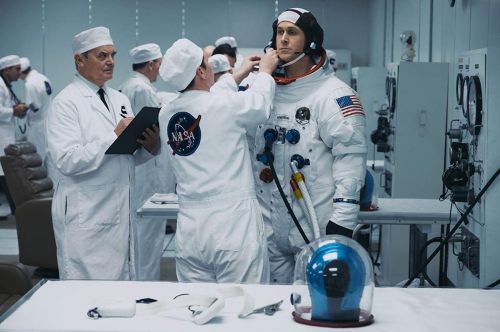Cinema | October 17th, 2018

Damien Chazelle’s fourth feature follows the trajectory common to the careers of many ambitious and talented filmmakers honored with Academy Awards: the dissipation of rawness and experimentation as budgets, expectations, and stakes increase. “First Man,” a deeply self-serious adaptation of James R. Hansen’s Neil Armstrong biography of the same name, is the first of Chazelle’s features written by someone other than the director (the screenplay is the work of “Spotlight” Oscar-winner Josh Singer). The movie stars “La La Land” collaborator Ryan Gosling, and boasts meticulous attention to detail in the period reconstructions of America’s 1960s space program. Linus Sandgren’s photography alternates between frame-perfect stagings of familiar NASA footage and swooning flight porn eager to find new ways to dramatize the high-stakes endeavors.
A number of commentators have already wondered why Chazelle would choose this particular material at this particular time -- a kind of anti-“Hidden Figures.” Not only does the story focus entirely on a heroic white man whose colleagues are all white men, the relegation of Claire Foy’s Janet Armstrong to the grim and thankless part of the eternally supportive wife saddles the tremendous performer with too many scenes depicting her barely concealed bitterness as she carries on with Sisyphean domestic tasks -- folding laundry, disciplining children -- compounded by the absence of her mate and the physical and emotional distance between them.
Just as troubling is the way in which “First Man” expresses no interest in probing the complexities of space race mythologizing, content instead to follow the bullet points of historical moments along the path from JFK’s exploratory ambitions to the world-famous “giant leap for mankind.” Richard Brody’s emphatic critique, in which he refers to “First Man” as a “right-wing fetish object,” blasts what he reads as the movie’s regressive shortsightedness. Brody argues that Chazelle has made “a film of deluded, cultish longing for an earlier era of American life…,” and the irony of political jabs at the movie from the likes of Marco Rubio and Donald Trump (who both attacked the film for not depicting the planting of the American flag on the lunar surface) is not lost on “The New Yorker” writer.
When Leon Bridges appears as Gil Scott-Heron in a protest montage performing “Whitey on the Moon,” the movie briefly comes alive in a way that is almost entirely missing from the hermetically sealed history lessons depicting the efforts overseen by Kyle Chandler’s Deke Slayton and Ciaran Hinds’ Robert Gilruth. I couldn’t exactly be sure what Chazelle intended by using a clip of Kurt Vonnegut advocating for social/domestic spending over the steep costs of the space program, but that line of inquiry disappeared as quickly and unexpectedly as it arrived, returning us to the immediate concerns of the inscrutable and stoic Armstrong.
At 138 minutes, “First Man” is longer than it needs to be. I kept imagining an alternate, 84-minute version of the movie made by Chazelle in his early 20s for 60,000 dollars, and decided it would almost certainly be more interesting and entertaining than the 2018 number that cost more than 60 million bucks.
February 16th 2026
February 16th 2026
February 9th 2026
February 4th 2026
January 26th 2026
_(1)_(1)_(1)_(1)_(1)__293px-wide.jpg)

_(1)__293px-wide.jpg)


